人教版五上英语重点语法句型复习课件(共18张PPT)
文档属性
| 名称 | 人教版五上英语重点语法句型复习课件(共18张PPT) | 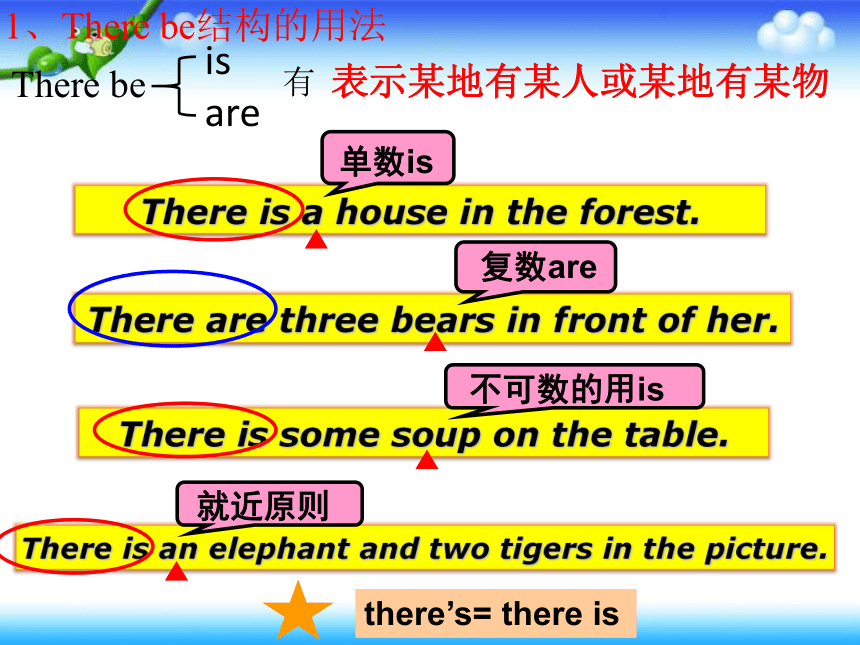 | |
| 格式 | pptx | ||
| 文件大小 | 3.1MB | ||
| 资源类型 | 教案 | ||
| 版本资源 | 人教版(PEP) | ||
| 科目 | 英语 | ||
| 更新时间 | 2023-04-30 14:51:01 | ||
图片预览

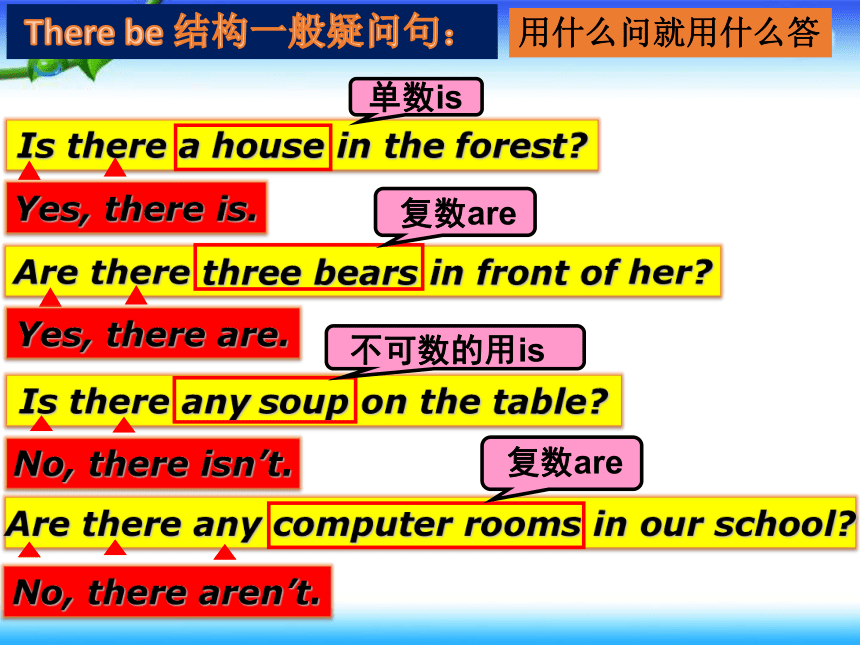
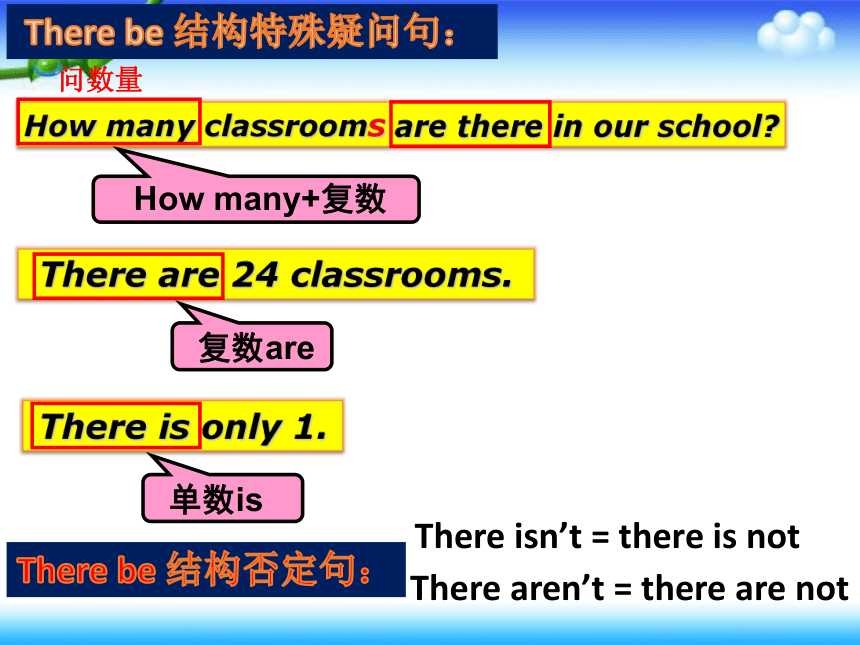
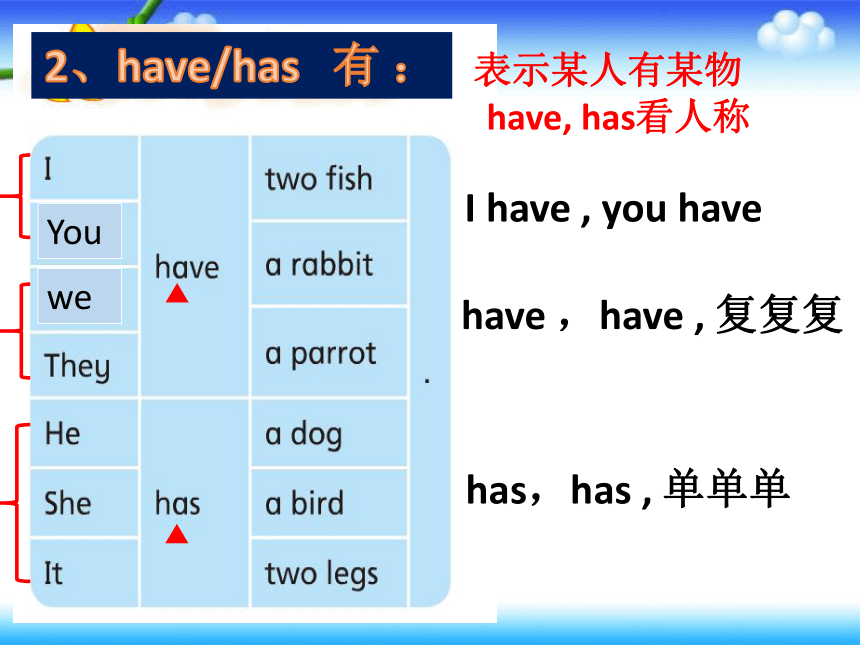
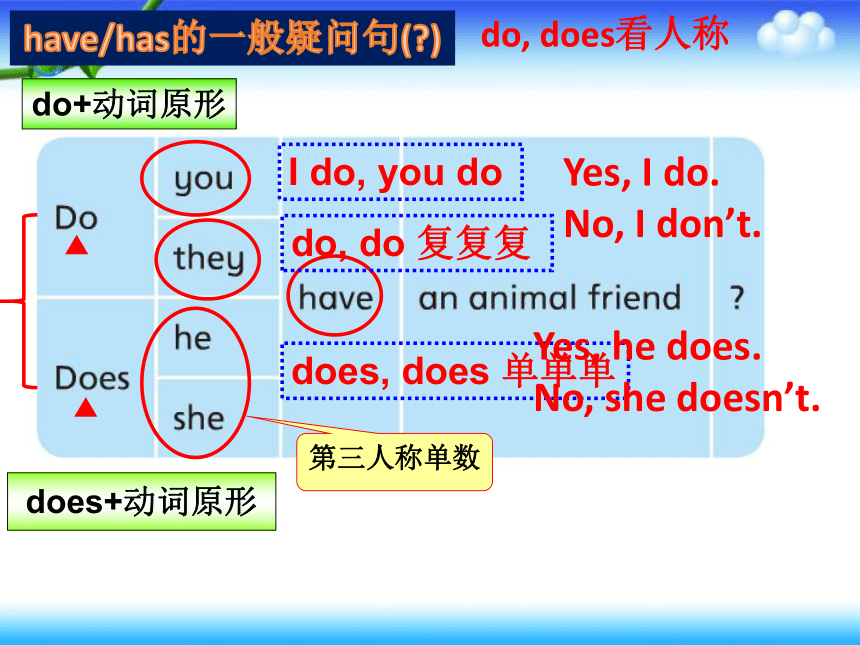
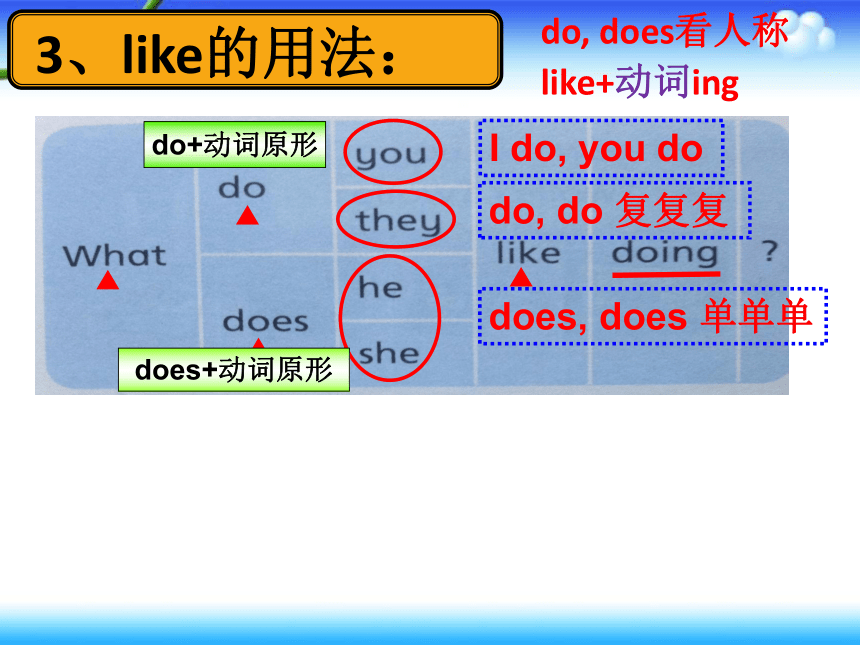
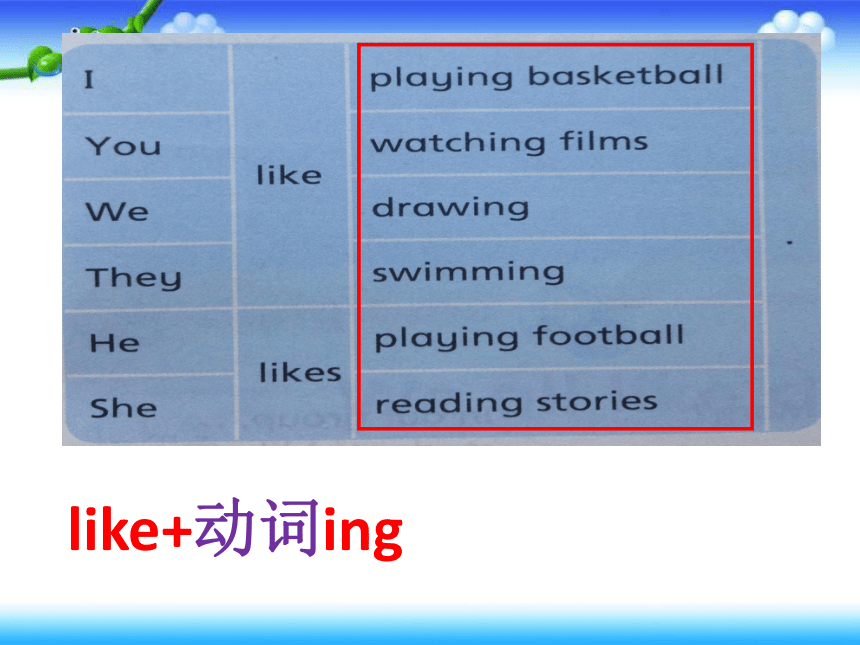
文档简介
(共18张PPT)
1、There be结构的用法
There is a house in the forest.
There is some soup on the table.
There is an elephant and two tigers in the picture.
There are three bears in front of her.
there’s= there is
复数are
There be
is
are
有
表示某地有某人或某地有某物
不可数的用is
单数is
就近原则
Is there a house in the forest
Are there three bears in front of her
Is there any soup on the table
Are there any computer rooms in our school
There be 结构一般疑问句:
单数is
复数are
不可数的用is
复数are
Yes, there is.
No, there isn’t.
Yes, there are.
No, there aren’t.
用什么问就用什么答
How many classrooms are there in our school
There be 结构特殊疑问句:
How many+复数
There are 24 classrooms.
There is only 1.
复数are
单数is
问数量
There be 结构否定句:
There isn’t = there is not
There aren’t = there are not
2、have/has 有 :
You
we
I have , you have
表示某人有某物
have ,have , 复复复
has,has , 单单单
have, has看人称
do+动词原形
I do, you do
does+动词原形
第三人称单数
have/has的一般疑问句( )
do, do 复复复
does, does 单单单
do, does看人称
Yes, I do.
No, I don’t.
Yes, he does.
No, she doesn’t.
3、like的用法:
I do, you do
do, do 复复复
does, does 单单单
do, does看人称
do+动词原形
does+动词原形
like+动词ing
like+动词ing
like+动词ing形式规则:
read→reading
draw→drawing
sing→singing
play→playing
dance→dancing
skate→skating
swim→swimming
chat→chatting
run→running
sit→sitting
shop→shopping
1.一般在动词后直接加 ing。
2.以不发音的字母e结尾的动词,则要先去掉字母 e再加 ing。
3.以重读闭音节结尾的动词,双写尾字母再加 ing。
Rules(规则):
关于like:
like的后面可以接名词
I like apples. (表示喜欢的是一类事物)
He likes this cake.
(表示特别指定,前面有限定词)
(b) like的后面接不可数原形
like milk 喜欢牛奶
注意:My hobby is playing basketball.
爱好(hobby)一般表示喜欢(like),动词+ing
like——likes[三单(第三人称单数)后动词加s或es]
4、[三单(第三人称单数)后动词加s或es]
work→works
make→ makes
drive→ drives
help→helps
teach→teaches
watch→watches
brush → brushes
go → goes
study→studies
fly→flies
1.一般情况在动词后直接加s 。
2.以ch,sh,s, x,或o结尾的动词加es 。
3.以辅音字母加y结尾的动词,变y为i再加es 。
Rules(规则):
特殊形式:have →has
[三单(第三人称单数)后动词变化规则]
三单(第三人称单数)指he, she, it
注意:(如: my father--he, Su Hai--she, the dog--it... )
5、问职业
What
do
you
they
does
your father
his mother
her mother
do
I do, you do
do, do 复复复
does, does 单单单
回答职业用be动词
I’m= I am
He’s= He is
She’s= She is
语法点拨:
当主语是第三人称单数时请注意缩写形式.
5、问事:
What
do
you
they
does
your father
his mother
her mother
do
I do, you do
do, do 复复复
does, does 单单单
与问职业句型一样,区别:结尾一般有时间说明
at weekends
after school
after dinner
回答事注意:
I always have dinner with my grandparents.
They usually fly a kite and have a picnic.
She often has dancing lessons.
He sometimes goes to the cinema.
人称
时间:
[三单(第三人称单数)后动词加s或es]
句型及语法
1. I can play basketball well.
can +动词原形
2. I am good at playing the piano.
be good at +doing
3. He likes playing table tennis too.
4. They both like reading books. (both两者都)
5. They all like reading books.(all三者都)
6. I sometimes go shopping before Christmas.
I go to play basketball at weekends.
go +动词ing (紧跟)
7. I write an email to my e-friend.
8. I send a card to Nancy.
9. This Christmas card is for Mike.
句型及语法
Who 问人 (填问句找答句,注意be动词)
Where问地点
When问时间
What问事
Let’s表示建议
Subjects 课程
First / Next / Then / Finally的顺序
1、There be结构的用法
There is a house in the forest.
There is some soup on the table.
There is an elephant and two tigers in the picture.
There are three bears in front of her.
there’s= there is
复数are
There be
is
are
有
表示某地有某人或某地有某物
不可数的用is
单数is
就近原则
Is there a house in the forest
Are there three bears in front of her
Is there any soup on the table
Are there any computer rooms in our school
There be 结构一般疑问句:
单数is
复数are
不可数的用is
复数are
Yes, there is.
No, there isn’t.
Yes, there are.
No, there aren’t.
用什么问就用什么答
How many classrooms are there in our school
There be 结构特殊疑问句:
How many+复数
There are 24 classrooms.
There is only 1.
复数are
单数is
问数量
There be 结构否定句:
There isn’t = there is not
There aren’t = there are not
2、have/has 有 :
You
we
I have , you have
表示某人有某物
have ,have , 复复复
has,has , 单单单
have, has看人称
do+动词原形
I do, you do
does+动词原形
第三人称单数
have/has的一般疑问句( )
do, do 复复复
does, does 单单单
do, does看人称
Yes, I do.
No, I don’t.
Yes, he does.
No, she doesn’t.
3、like的用法:
I do, you do
do, do 复复复
does, does 单单单
do, does看人称
do+动词原形
does+动词原形
like+动词ing
like+动词ing
like+动词ing形式规则:
read→reading
draw→drawing
sing→singing
play→playing
dance→dancing
skate→skating
swim→swimming
chat→chatting
run→running
sit→sitting
shop→shopping
1.一般在动词后直接加 ing。
2.以不发音的字母e结尾的动词,则要先去掉字母 e再加 ing。
3.以重读闭音节结尾的动词,双写尾字母再加 ing。
Rules(规则):
关于like:
like的后面可以接名词
I like apples. (表示喜欢的是一类事物)
He likes this cake.
(表示特别指定,前面有限定词)
(b) like的后面接不可数原形
like milk 喜欢牛奶
注意:My hobby is playing basketball.
爱好(hobby)一般表示喜欢(like),动词+ing
like——likes[三单(第三人称单数)后动词加s或es]
4、[三单(第三人称单数)后动词加s或es]
work→works
make→ makes
drive→ drives
help→helps
teach→teaches
watch→watches
brush → brushes
go → goes
study→studies
fly→flies
1.一般情况在动词后直接加s 。
2.以ch,sh,s, x,或o结尾的动词加es 。
3.以辅音字母加y结尾的动词,变y为i再加es 。
Rules(规则):
特殊形式:have →has
[三单(第三人称单数)后动词变化规则]
三单(第三人称单数)指he, she, it
注意:(如: my father--he, Su Hai--she, the dog--it... )
5、问职业
What
do
you
they
does
your father
his mother
her mother
do
I do, you do
do, do 复复复
does, does 单单单
回答职业用be动词
I’m= I am
He’s= He is
She’s= She is
语法点拨:
当主语是第三人称单数时请注意缩写形式.
5、问事:
What
do
you
they
does
your father
his mother
her mother
do
I do, you do
do, do 复复复
does, does 单单单
与问职业句型一样,区别:结尾一般有时间说明
at weekends
after school
after dinner
回答事注意:
I always have dinner with my grandparents.
They usually fly a kite and have a picnic.
She often has dancing lessons.
He sometimes goes to the cinema.
人称
时间:
[三单(第三人称单数)后动词加s或es]
句型及语法
1. I can play basketball well.
can +动词原形
2. I am good at playing the piano.
be good at +doing
3. He likes playing table tennis too.
4. They both like reading books. (both两者都)
5. They all like reading books.(all三者都)
6. I sometimes go shopping before Christmas.
I go to play basketball at weekends.
go +动词ing (紧跟)
7. I write an email to my e-friend.
8. I send a card to Nancy.
9. This Christmas card is for Mike.
句型及语法
Who 问人 (填问句找答句,注意be动词)
Where问地点
When问时间
What问事
Let’s表示建议
Subjects 课程
First / Next / Then / Finally的顺序
